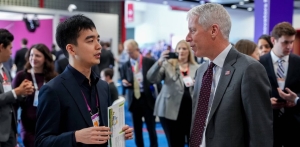Dartmouth showcased its dedication to energy innovation at CERAWeek in Houston from March 10-14, 2025, in true Texan fashion — demonstrating big and bold ambition. As a proud partner, The Arthur L. Irving Institute for Energy & Society highlighted its substantial contributions across dozens of events addressing pressing global challenges.
CERAWeek is regarded as one of the most influential annual conferences in the energy sector, drawing nearly 10,000 executives, policymakers, investors, entrepreneurs, and scientists from around the globe. Attendees engaged in a week filled with hundreds of discussions, covering topics such as domestic energy production, the influence of AI on energy systems, the rapid deployment of solar energy, the evolving policy landscape, and pioneering carbon capture technologies.
The Irving Institute brought 25 delegates who actively networked with industry leaders and exchanged ideas. Our faculty, staff, and affiliated startups delivered over two dozen presentations throughout the week, grouped into three major themes: high-risk, high-reward research and innovation; artificial intelligence (AI) and energy systems; and energy policy.
High-Risk, High-Reward Research and Innovation
Mukul Sharma presented his novel approach to marine-based carbon capture and sequestration, while Geoffroy Hautier shared his research on applying AI to high-throughput screening to discover Earth-abundant solar cell materials. If commercialized, these innovations have the potential to lead to gigaton-scale carbon removal solutions and increase solar photovoltaic efficiency by 10-20%, respectively. Lee Lynd and his company Terragia gave two presentations about the future of biofuels. His cellulosic biofuel production methodology, when combined with carbon capture techniques, can achieve a carbon intensity as low as minus 150–essentially removing carbon dioxide from the atmosphere. Finally, Kim Rosenfield spoke about the critical role of industrial-academic collaborations in transforming innovations like these from the lab to the market. Such partnerships are essential for driving progress.
AI and Energy Systems
The conversations surrounding AI's opportunities and challenges within energy systems were abundant. Geoff Parker discussed the impact of AI on labor markets and how it can optimize efficiencies in manufacturing and energy systems. Junbo Zhao highlighted the importance of AI interventions that enhance rather than replace human judgment, advocating for designs that are fundamentally human-centered.
Energy Policy
Discussions on energy policy spanned both domestic and international landscapes. Erin Mayfield, who conducted rigorous modeling to inform implementation of the Inflation Reduction Act and Bipartisan Infrastructure Law, explored how these landmark policies could invigorate American manufacturing and job growth. Derek Walker stressed the critical need for stable policy environments to enable early-stage innovations to thrive as well as the possibilities for bipartisan collaboration. Vikrant Vaze shared his research on developing green energy infrastructure in conflict-affected regions of Africa, focusing on the critical interplay between sustainability, energy security, and finance.
"Dartmouth's presence at CERAWeek is a testament to our commitment to driving transformative change in the energy sector. Through innovative research and meaningful collaborations, we are poised to help shape the evolution of affordable, reliable, and equitable energy systems. Our engagement at this prominent conference gives us a stronger platform to tackle some of the most urgent energy challenges facing the world today." - Derek Walker, Irving Institute Executive Director












